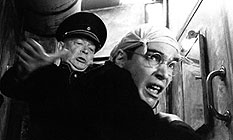|
|
|
|
Zentropa
|
 |
|
Lars von Trier's Zentropa (changed for some territories from Europa so as not to be confused with Agnieska Holland's Europa, Europa [1991]) is a very strong candidate for the most overrated, over-hyped arthouse event that swept the globe in the early '90s. The film promises a grand historical allegory. Leo Kessler (Jean-Marc Barr) is an extremely naïve American who wants to work in post-war Germany for the sake of world peace. He is put to work on a rather gothic, cross-country train. Soon, he becomes the patsy for every double-crossing scheme hatched amidst the German ruins. All this (the director assures us in interviews) is a profound comment on European unification in the '90s. Viewers who stay to the final credit may shudder to learn that this is merely one third of the director's Europa Trilogy. Von Trier's view of world history is vacuous; his nasty, vaguely punk misanthropy can be fairly reduced to the simple statement: "Europe is hell". This makes him perhaps the most superficial nihilist in contemporary world cinema. Zentropa is equally empty on a stylistic level. Von Trier seems to swipe dozens of tricks and ideas from less well distributed directors like Hans Jurgen Syberberg and Raúl Ruiz. The film is full of manic switchings from black and white to colour, dream-like back-projected screens, and cubist collages of faces and model trains. Yet the sum effect is scarcely greater than in a slick television advertisement or a glossy rock video. The film is not completely worthless. The first and last minutes – aided greatly by Max von Sydow's ghostly, hypnotic narration – have a powerful, atmospheric effect. The other 105 minutes in between may provide a feast for the eyes, but precious little nourishment for the brain. MORE von Trier: The Boss of It All, Breaking the Waves, Dancer in the Dark, The Five Obstructions, The House That Jack Built, The Kingdom © Adrian Martin July 1992 |
![]()